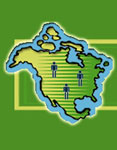International Activities
Global Carbon Project

In 2007, the Global Carbon Project Scientific Steering Committee accepted Terms of Reference that recognized the U.S. Carbon Cycle Science Program Office as an Affiliated Office of the Global Carbon Project Office.
REgional Carbon Cycle Assessment and Processes (RECCAP): As an international effort to establish the mean carbon balance and change over the period 1990–2009 for all subcontinents and ocean basins, RECCAP is an activity of the Global Carbon Project, with two major sponsors, E.U. COCOS (Coordination Action on Carbon Observation Systems) and the U.S. Carbon Cycle Science Program. A special issue of Biogeosciences focused on REgional Carbon Cycle Assessment and Processes (RECCAP) was completed in 2015.
CarboNA

CarboNA is an international collaboration between Canada, Mexico, and the United States for carbon cycle science research throughout North America and adjacent coastal waters. The overall goal is to understand the temporal and regional distribution and magnitudes of carbon pools and greenhouse gas fluxes throughout North America, and how these affect and are affected by disturbances, human behavior, and climate and related changes, in order to predict future climate change and evaluate carbon related mitigation strategies and new technologies. In the United States, CarboNA comes under the auspices of the Carbon Cycle Science Program and the Carbon Cycle Interagency Working Group and includes work from both the North American Carbon Program and the Ocean Carbon and Biogeochemistry program.
North American Carbon Program (NACP)

Introduction
The North American Carbon Program (NACP) is designed to address strategic research question 7.1 in the U.S. Climate Change Science Program Strategic Plan:
- What are the magnitudes and distributions of North American carbon sources and sinks on seasonal to centennial time scales, and what are the processes controlling their dynamics?
It will quantify the magnitudes and distributions of terrestrial, freshwater, oceanic, and atmospheric carbon sources and sinks for North America and adjacent oceans; enhance understanding of the processes controlling source and sink dynamics; and produce consistent analyses of North America’s carbon budget that explain regional and continental contributions and year-to-year variability. This program is committed to reducing uncertainties related to the increase of carbon dioxide and methane in the atmosphere and the amount of carbon, including the fraction of fossil fuel carbon, being taken up by North America’s ecosystems and adjacent oceans, including uncertainty regarding the fraction of fossil fuel carbon.
More information about NACP is available from the NACP website.




